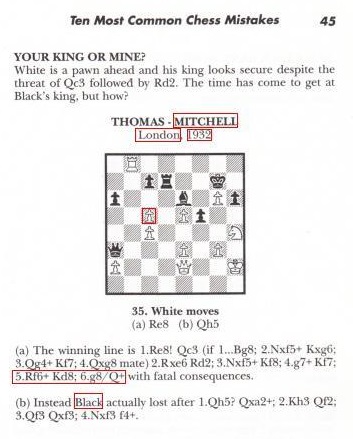
Edward Winter

We offer a representative sample of Larry Evans’ innumerable gaffes and scurrilities. In the opening vignette he is to be witnessed not only in a pitiful muddle over the key points about a tournament game (from an event in which he participated) but also denouncing us as ‘unscrupulous’ for writing something which a) we did not write, and b) nobody else wrote either.
In the January-February 1987 issue of our magazine Chess Notes (page 6; C.N. 1312) we quoted without comment a passage from page 175 of Evans’ book Modern Chess Brilliancies:
‘… At Havana 1952, one of my first great international tournaments, I learned at first hand the full meaning of Tartakower’s dictum that “you can’t win by resigning”. The Dutch master Prins was a piece down against one of the Cuban lesser lights, Quesada; his position was obviously hopeless, but he insisted on adjourning the game. When I asked Prins why he didn’t resign immediately, he replied that anything can happen. Sure enough, his opponent obliged the next day by dying of a heart attack. Such drastic solutions to the problem of saving a lost game do not readily present themselves. Nor does such a stubborn attitude endear a master to his colleagues.’
The next issue of Chess Notes (March-April 1987, page 49; C.N. 1385) quoted a documented denial received from Prins:
‘In C.N. 1312 a mystification is quoted from Modern Chess Brilliancies, page 175, by Larry Evans.
1)… “the Dutch master Prins insisted on adjourning the game” (with J. Quesada, Havana, 1952).
In fact I resigned after Quesada’s 35th move, as confirmed in the Bulletin by Jack Spence (number 39, published 1959/60, in a series of limited editions), where the times read 1h.10 min. for White, 1h.59 min. for Black.
2) Mr Quesada played at least three more games, among which draws with Pomar and Torán, thus casting doubt on Evans’ claim of his dying “the next day”.
3) Evans’ allegation about “drastic solutions to the problems of saving a lost game” would seem to be a mere fabrication. Besides, Capablanca, Alekhine, Euwe, to name a few, used to put up perfectly legitimate resistance when a piece down, or more.
4) Which stamps Evans’ “nor does such a stubborn attitude endear a master to his colleagues” almost as defamation of character.’
In that C.N item we then added a brief factual note of our own:
‘Rob Verhoeven sends us an extract from Jack Spence’s book of the tournament, which indicates that the Quesada-Prins game was played in the 13th round, on 9 March. We can add that according to page 40 of Palacio’s Ajedrez en Cuba Quesada died on 14 March 1952.’
We provided Evans with a complimentary copy of that issue of Chess Notes (despite often criticizing the magazine, he never subscribed) to enable him to reply if he so wished. He availed himself of this opportunity by sending us a letter teeming with outlandish smears but which we nonetheless published in full in C.N. 1457. On the Quesada-Prins issue he wrote:
‘Re. C.N. 1385: memory plays tricks. I recalled Prins winning a hopeless adjournment from Quesada, who died before the game could be finished. I no longer have the scoretable of Havana 1952 but if Prins says he resigned, far be it from me to quibble. I stand corrected even though you must admit it makes a good story.
But you are unscrupulous to deduce that I am defaming the character of Capa, Alekhine and Euwe merely because I made the perfectly banal observation that dragging out hopeless positions does “not endear a master to his colleagues”. I wasn’t even thinking of the trio you dragooned out to discredit me. If I have something negative to say about any of the world champions, I can do it myself without your putting words in my mouth.’
We responded as follows on the same page:
‘The Prins-Quesada episode is not “a good story” once it is shown to be untrue. Mr Evans accuses us of being unscrupulous, dragooning out a trio, putting words in his mouth, etc., but how could he overlook that in C.N. 1385 the writer is Lodewijk Prins? Or that what Mr Prins wrote bears no relation to what Mr Evans claims was written? Nobody has suggested that Larry Evans was “defaming the character of Capa, Alekhine and Euwe”; Mr Prins simply pointed out that even those three world champions had played on – legitimately – when behind on material. Mr Evans’ inability to read plain English is remarkable.’
As Prins wrote to us subsequently, Evans’ standpoint was ‘extraordinarily silly’. But was it a freak occurrence? Read on.
In his December 1999 column, an item about the age factor in chess masters, Evans was asked a question which included a reference to a match (against Steinitz) which Zukertort was said to have played, at the age of 44, in 1892. As we pointed out in the February 2000 issue (page 8), this was unlikely, given that Zukertort had died in 1888. That could have been the end of the matter, but Evans’ response on the same page was as emphatic as it was false:
‘Edward Winter has an exaggerated notion of his own importance and, as usual, makes mountains out of molehills (obviously 1892 was a typo instead of 1872).’
He continued to construct his own mountain in the July 2001 column:
‘Does Mr Winter truly believe it [i.e. the date 1892] was anything more than a typographical error? I think not.’
An interesting question. The date 1892 that appeared in the December 1999 issue was obviously wrong, but was it, as Evans assured his readers, an obvious typo for 1872? Definitely not, for the simple reason that 1872 is also wrong. Since the Steinitz-Zukertort match under discussion was specified as having been played when Steinitz was 50 and Zukertort was 44 (although their actual ages were 49 and 43 respectively), the event was ‘obviously’ their world championship match of 1886. A normal writer would be embarrassed to discover that in endeavouring to correct one wrong date (1892) he had categorically and disparagingly put forward another one (1872) which in reality was even further from the right one (1886).
Let’s make a brief survey of his Chess Life columns from December 1999 onwards. Even a well-known title such as The Oxford Companion to Chess can prove excessively difficult for Evans to copy correctly. In December 1999 he called it ‘The Oxford Encyclopedia of Chess’, just as he had done the previous month too. We corrected him on page 8 of the February 2000 Chess Life, but Evans still came up with something different again in June 2000: ‘The Oxford Companion of Chess’. Another reference work mentioned (in December 2000) was Edward Brace’s An illustrated Dictionary of Chess, except that Evans called it ‘An Illustrated History Of Chess’. In the following issue (January/February 2001) he managed to reproduce impeccably the title A Short History of Chess, but this time it was the author’s name that defeated him: Henry A. Davidson, and not ‘Davison’. It is no easy matter for Evans to achieve a matching pair of correct title and correct author.
In July 2000 Evans presented a diagram from the famous game between Averbakh (Evans writes ‘Averbach’) and Purdy, played in 1960 in Australia (‘Austalia’), which had been published in his book Chess Catechism. In that volume (page 39) Evans had given an inaccurate diagram, omitting a white pawn on g3, so has his level of accuracy changed in the three decades since the book appeared? Yes, indeed. In his July 2000 column the white pawn on g3 is still missing, but now there is a second absconder, from the black side: a pawn at a7.
In the following month’s column a reader won the best question prize for requesting Capablanca’s score during his invincible period between his loss to Chajes at New York, 1916 and his defeat by Réti at New York, 1924. Evans, though, is no more a statistician than an historian. The totals he gave were all wrong.
In June 2001 he stated that Alekhine beat Bogoljubow in 1927, instead of 1929.
Following the publication of two game positions in the December 1999 Chess Life we wrote to the magazine:
‘If “Evans on Chess” is to lift work from my Chess Notes (i.e. the Borochow and Junge items in the December 1999 Chess Life) would it not at least be possible for that to be specified and for the material to be used accurately?’
This complaint, published in the correspondence column of the February 2000 Chess Life, was straightforward: his December 1999 column had included two positions (from the games Borochow v Fine, Pasadena, 1932 and N.N. v O. Junge, Concepción, circa1909) taken, a reader in the Philippines said, from ‘our local magazine Chess Asia’. The fact that they were culled from Chess Notes (which, at that time, Chess Asia was still publishing) was given no mention whatsoever.
One of the two positions discussed above deserves a separate section here. The famous miniature between Borochow and Fine at Pasadena, 1932 is yet another example of how facts in Evans’ hands stand no chance. This is shown by C.N. 1968, in which we wrote:
According to a number of books, the late Reuben Fine once lost a tournament game in seven moves. The score of H. Borochow v Reuben Fine, Pasadena, 1932 is often said to be: 1 e4 Nf6 2 e5 Nd5 3 c4 Nb6 4 d4 Nc6 5 d5 Nxe5 6 c5 Nbc4 7 f4 Resigns.
Page 436 of the August 1978 Chess Life & Review published a letter from G.S.G. Patterson, the President of the Pasadena, 1932 International Chess Congress, reporting that the actual moves were: 1 e4 Nf6 2 e5 Nd5 3 d4 Nc6 4 c4 Nb6 5 d5 Nxe5 6 c5 Nbc4 7 f4 e6 8 Qd4 Qh4+ 9 g3 Qh6 10 Nc3 exd5 11 fxe5 Resigns.
Patterson’s letter specifically corrected Larry Evans, who had affirmed (Chess Life & Review, October 1977, page 557) that Fine won the game. Even so, in a book published several years later – The Chess Beat – Mr Evans repeated, in large bold letters, his claim that ‘Black won’ (after 7 f4 e6), adding ‘But Chernev says Black resigned!’ (page 24). For our part, we see no reason to doubt G.S.G. Patterson’s version of the score. Mr Evans’ unaccountable assertion that Fine won is refuted by the tournament crosstable.
This text was reproduced on pages 314-315 of Kings, Commoners and Knaves, together with C.N. 2084. That latter item (which was the basis of what appeared in Evans’ December 1999 column) reported on the researches by a correspondent of ours, Val Zemitis. Mr Zemitis also had a brief note published in Evans’ May 2000 column, in which he expressed the belief that the game had indeed lasted eleven moves ‘instead of the seven as cited by Irving Chernev’. The intriguing point here is Evans’ rejoinder: ‘You can’t take all of Chernev’s “facts” too seriously.’
Unlike Evans’ ‘facts’, perhaps? Chernev had indeed been wrong (in a book published back in the mid-1950s) to give a seven-move version of the game, but at least he had correctly stated that it was White who won. Question: which author claimed in 1977 that it was Black who won? Answer: Evans. Question: which author was publicly corrected on this point in 1978? Answer: Evans. Question: which author nonetheless maintained in a 1982 book that Black won? Answer: Evans. Question: which author scoffed at that time, ‘But Chernev says Black resigned!’? Answer: Evans. Question: which author nonetheless has the gall to criticize Chernev for inaccuracy regarding this game? Answer: Evans.
The not-so-lucky winners of Evans’ monthly ‘best question’ prize gain a further opportunity to assess his manhandling of facts, since the recompense is a copy of his book The 10 Most Common Chess Mistakes, a volume which his column contrives to mention repeatedly, in both the questions and the answers. The full title of the book is The 10 Most Common Chess Mistakes … and how to avoid them! (although ‘aviod’ is the spelling on the spine), and the chapter headings include many subjects in which Evans undeniably specializes: ‘Premature Aggression’, ‘Miscalculation’, ‘Impulsiveness’ and ‘Inattention’. In C.N. 2316 (i.e. on pages 97-98 of the 6/1999 New in Chess) we took a brief look at the book:
Are ‘unspeakable’ and ‘characteristically inept’ justified descriptions of Larry Evans or have we been exaggerating? His 1998 book The 10 Most Common Chess Mistakes (Cardoza Publishing) provides an opportunity to judge. Although each page has little on it (just one position), Evans still manages to stockpile the blunders. Two illustrations for now:
On page 45 (containing less than ten lines of text) Evans makes the following errors:
‘Thomas – Mitchell’; Black’s name was Michell.
‘London, 1932’; the game was played at the Hastings, 1932-33 tournament.
Wrong diagram, since the pawn at c5 should be black.
In his paragraph (a) Evans omits mention of the faster win 5 Re7+.
In his paragraph (b) he writes ‘Black actually lost’, whereas Black actually won.Then page 157 has an alleged position from the Marshall v Capablanca match of 1909 (5th game), with Evans claiming that, ‘incredibly’, White missed an immediate victory (mate or gain of the queen) through 45 Qe8+. Untrue, because Marshall’s queen was on b6, and not c6. This elementary matter has been pointed out countless times, and even by Evans himself on page 750 of Chess Life & Review, November 1974.
As regards the substance of our charge that ‘Evans on Chess’ has very few actual chess games and positions but features a barrage of chess politics (especially of the frenetically anti-FIDE variety), that too is an easily proven fact. Within the period under discussion here (i.e. from December 1999 to July 2001), the question and answer sessions in ‘Evans on Chess’ contained the following:
5 columns with at least one full game-score: December 1999 (two games, including Borochow v Fine …), March 2000 (one game, which Evans did not realize was a hoax), December 2000 (an Evans win from 1967 and two games from the pre-history of chess), March 2001 (Kasparov v a celebrity and the Maróczy v Korchnoi ‘astral correspondence’ game), June 2001 (Alekhine v Böök – or ‘Book’ as Evans writes the name). These games were not annotated.
14 columns without any full game-scores: January 2000, February 2000, April 2000, May 2000, June 2000, July 2000, August 2000, September 2000, October 2000, November 2000, January/February 2001, April 2001, May 2001, July 2001. Moreover, of these 14 columns, two had neither game-scores nor even positions: February 2000, January/February 2001.
Contrast that with Evans’ treatment of political matters:
14 columns with criticism of FIDE: December 1999, January 2000, February 2000, March 2000, April 2000, May 2000, June 2000, July 2000, September 2000, October 2000, November 2000, January/February 2001, March 2001, June 2001.
5 columns without criticism of FIDE: August 2000, December 2000, April 2001, May 2001, July 2001.
It might be argued that if Evans can get away with (mis)using his column as a soapbox for incessant regurgitation of his political sentiments and conjecture, so be it, but in his politicking Evans cuts no more of a credible figure than in the rest of his output. Readers are referred, by way of example, to a detailed article by John Watson entitled ‘Chess and Politics’ (Kingpin, Spring 1999, pages 33-38), which contains such observations on Evans as: ‘huge bias’; ‘long histories of ignoring and distorting evidence’ and ‘Evans’ absurd arguments’.
Page 60 of the Autumn 1999 Kingpin carried a brief reply from Evans. Although, in reality, he replied to virtually nothing, he did dispute Watson’s description of Taylor Kingston as a critic of Evans’ claims (claims made, wrote Watson, without ‘even a shred of actual evidence’) that Keres was forced to throw his games to Botvinnik in the 1948 world championship event. In his ‘reply’ Evans triumphantly quoted a supportive letter from Kingston which had been published in his August 1997 Chess Life column. A devastating blow? Yes, but against Evans. That became manifest when the Spring 2000 issue of Kingpin (page 64) published this response from Taylor Kingston:
‘I did indeed write the letter Evans quotes, but that was before I researched and analyzed his article in detail. On deeper examination I found his logic and evidence to be highly questionable. I made this quite clear, both publicly in my article “Keres and Botvinnik: A Survey of the Evidence” (CL 5/98) and privately in letters to Evans himself. For Evans to say or even imply that I now support him, is amazingly, grossly dishonest.’
‘Amazingly, grossly dishonest.’ Somehow such words keep coming back in any discerning scrutiny of Evans’ writings. In 2000 Yasser Seirawan published on his Inside Chess website a strongly-worded open letter ‘Enough is Enough’ which called on the FIDE President to resign. In a follow-up article (also on-line at Inside Chess) Seirawan reviewed the reaction, including that of the ‘long time rabid critic of FIDE, GM Evans’. After pointing out how Evans had misrepresented his open letter, Seirawan concluded: ‘Experienced Evans-watchers know that it is the kind of untruth and distortion that is endemic in him.’
The above article about Larry Evans, who over the years has made countless deceitful attacks on us, is reprinted from pages 316-321 of A Chess Omnibus. It is an abridged version of our June 2001 exposé of him at the Chess Café Skittles Room.
See too Borochow v Fine, Pasadena, 1932.
The Chess Beat (Pergamon Press, 1982) is a reproduction of 300 newspaper columns written by Larry Evans.
Popular chess journalism is not easy to enjoy or admire, based as it is on an unflattering estimation of what its public will find readable. Soggy in its determination neither to offend nor to inspire, it is generally anti-intellectual and repetitious; unbending in its evident belief that the game itself is a bitter pill for public taste, it tries to sweeten everything by labouring ‘the human side of chess’, to quote a book title by a notorious popular journalist, Fred Reinfeld. It is believed, for instance, that giving an explanation of Pillsbury’s style is bound to bore and displease; far better to list the 30 or so difficult words that he allegedly memorized and repeated backwards and forwards. That is considered An Entertaining Read. No matter that the story may or may not be true, or that it has already been published in 500 other places. Could not something original be written? Not really, because popular journalists do not research. They repeat. It is not only their columns that are syndicated. So is the very ‘information’ they peddle.
Larry Evans’ column, to judge from the 300 (best?) selected by Pergamon, has no shortage of rough edges, but the contents are mostly of some interest. He is at his best when recounting contemporary events, whether it be a world championship match or one more instance of USCF mismanagement. [An endnote on page 269 of Chess Explorations mentioned that this article of ours was written in 1983 and that Larry Evans’ subsequent handling of topical issues matched his treatment of history.] He is at his most average when reviewing books, his casualness allowing many poor titles to pass through without stricture. He is at his worst when horowitzing or reinfelding, as in the frightful article number 120 (chirpy notes and anecdotes about the masters which are the unverifiable mainstay of popular chess journalism).
It is depressing to find that even a seasoned grandmaster seems happier when writing about Fischer’s oddities (such as quoting B. Darrach that Fischer ‘walks the way a hen runs’ – column 8) rather than applying his grandmasterly skills to an explanation of the former world champion’s chess genius. Similarly, poor old Steinitz is fair game for Evans’ knock-about style. Not only is there no discussion of Steinitz’s contribution to chess, there is not a single game by him. (There are 20 by Evans himself. ) The collection does, however, present examples galore of Steinitz’s ‘eccentricity’. (No instances of Evans’ are given.) Perhaps that is what is called historical perspective.
In some ways Larry Evans’ journalism is of a superior quality. The trouble is that although his best is very good, Evans is not very often at it. What a pity that so much of his writing is archetypal popular chess journalism, in which the greatest chess geniuses of all time are systematically belittled and trivialized for no reason other than the fact that Al Horowitz wrote the same thing 50 years ago.
(323)
It is well known that many chess-obsessed writers turn out to be philistines with a capital F. Examples are welcomed. From our recent reading Larry Evans must be the current champion. Column 92 (page 40) of his anthology The Chess Beat ascribes the quotation ‘I think, therefore I am’ to Pascal. Possibly an understandable blunder in a hastily written syndicated piece, but how could it have been allowed to remain in a collection of his journalism? Perhaps he didn’t think it mattered.
(346)
C.N. 6636 reported that the chapter regarding masters’ mistakes on pages 313-333 of The Personality of Chess by I.A. Horowitz and P.L. Rothenberg (New York, 1963) has 41 positions. About 40% of them are in The 10 Most Common Chess Mistakes by L. Evans (New York, 1998).

The Personality of Chess. All four positions also appeared in The 10 Most Common Chess Mistakes.
Below is the complete text of C.N. 1457 (a letter from Mr Evans and our reply, published in 1987):
From Larry Evans (Reno, NV, USA):
‘Thanks for the complimentary C.N. 33. I always enjoy reading it, although the twisted logic and pro-Campo slant often detract from your admirable qualities. One is tempted to wonder if Campo has bought you off too, as he did by giving Hugh Myers (one of his only defenders in America) the job of bulletin editor at Dubai.
Re C.N. 1385: memory plays tricks. I recalled Prins winning a hopeless adjournment from Quesada, who died before the game could be finished. I no longer have the scoretable of Havana 1952 but if Prins says he resigned, far be it from me to quibble. I stand corrected even though you must admit it makes a good story.
But you are unscrupulous to deduce that I am defaming the character of Capa, Alekhine and Euwe merely because I made the perfectly banal observation that dragging out hopeless positions does “not endear a master to his colleagues”. I wasn’t even thinking of the trio you dragooned out to discredit me. If I have something negative to say about any of the world champions, I can do it myself without your putting words in my mouth.
I have noticed that almost every reference to me in C.N. is critical. In C.N. 1393 you take me to task for awarding a prize to a Chess Life reader who found that 40 h5 wins in the game Capa-Fine. This “discovery” is mentioned in Heidenfeld’s book Draw! but it in no way detracts from the stunning shock value of this missed win – only one reader pointed out it was not new. Fine himself appears unfamiliar with 40 h5! since his Lessons From My Games was reprinted in 1958 as A Passion for Chess and still does not contain this correction.
Finally, here is a 6,000 word news story which is critical of that thug who currently is president of FIDE. You are welcome to publish portions in full, although probably you will find a way to pick it to shreds by taking things out of context. Go to it – if you can! – it seems to be your customary style.
Meanwhile I hope you keep your curmudgeonly watch on the chess world. C.N. is unique and lively. Incidentally, one of the reasons Seattle lost out to Seville is that a lot of prize money was structured as “best game prizes” so Campo could not get his greedy hands on it.
Will you publish this in full? I wonder.’
1. The above is indeed the full text of Mr Evans’ letter.
2. He does not explain what he means by ‘twisted logic’ or ‘pro-Campo slant’. We have never been ‘bought off’ by anybody and never shall be.
3. The Prins-Quesada episode is not ‘a good story’ once it is shown to be untrue. Mr Evans accuses us of being unscrupulous, dragooning out a trio, putting words in his mouth, etc., but how could he overlook that in C.N. 1385 the writer is Lodewijk Prins? Or that what Mr Prins wrote bears no relation to what Mr Evans claims was written? Nobody has suggested that Larry Evans was ‘defaming the character of Capa, Alekhine and Euwe’; Mr Prins simply pointed out that even those three world champions had played on – legitimately – when behind on material. Mr Evans’ inability to read plain English is remarkable.
4. Most C.N. references to Mr Evans have indeed been critical, but they have also been carefully documented; until now he has never replied, despite our giving him the opportunity by sending him complimentary copies of issues in which he was mentioned. It would have been fascinating to have his answer to, for instance, C.N. 1192, where we criticized him for writing, ‘Whether GM Karpov was right or wrong, I believe that posterity will remember him mainly for ducking Fischer’. That, incidentally, is the same Larry Evans who wrote on page 10 of The Chess Beat: ‘It looks like Fischer has been ducking Karpov, not the other way around.’
5. The purpose of C.N. 1393 was to obtain information about the Capablanca-Fine position, and our only criticism of Mr Evans (made in a subordinate clause) concerned the illogicality of suggesting that 40 h5 could be called an ‘amazing discovery’ now even if it had been found before. We quoted the position only after waiting in vain for several months in case Chess Life readers came up with any details. Further carelessness in Mr Evans’ letter (and in the August Chess Life): his bibliographical details on Fine’s book are wrong.
6. The taking-out-of-context accusation. Readers with a good memory for trash will recall that an associate of Mr Evans’, Mr Larry Parr, made a similar suggestion in C.N. 1143. Neither, of course, has ever provided a single example to back up the claim.
7. The credibility of Mr Evans’ insultingly worded challenge to us to quote from his 6,000 word article (which mainly concerns US chess politics) is undermined by the fact that two days later he sent us a second letter saying that the exclusive European rights to the article had been sold to New in Chess and that for now we could not, after all, quote anything. We are glad that this second letter reached us: with Mr Evans’ characteristic eye for detail, it was addressed to ‘William Winter’.
8. His ‘Incidentally ...’ sentence in the penultimate paragraph is not relevant to anything that has appeared in C.N., though it serves as a further example of his crudity.
9. As regards the ‘dare’ in the last sentence of his letter, it is rather pathetic that he imagined that publication of his mishmash of hunches, blunders and scurrilities might prove awkward for anyone other than himself.
Mr Evans’ letter was dated 17 June. On 23 June we confirmed to him that we would indeed publish it in full, not least because it offered perfect justification of our criticisms of him. We gave detailed examples of how we should be replying in C.N. (along the lines of our points made above). Nonetheless, as a gesture, we also told him that if he apologized for his factual errors and unfounded attacks we would be prepared to keep his foolish letter private. ‘It is entirely up to you’, we added.
On 6 July Mr Evans replied: ‘I’m willing to let it remain a private matter and drop it in print, if this suits you. This is in no way an admission that I agree with any of your points ...’ If it suited us!! Despite his sudden loss of enthusiasm for having his letter published, Mr Evans did not offer the apology we had requested. The closest he came was in saying ‘It may be unfair to equate you with the Campo group ...’ and ‘I may have been a bit hasty in accusing you of being bought by Campo ...’
Mr Evans has been ‘unfair’ and ‘a bit hasty’ about far more than that. If he wants further rope in our next issue, he has only to write again.
(1457)
From Hugh Myers (Davenport, IA, USA):
‘I supported the re-election of Florencio Campomanes as President of FIDE, just as did about 80% of the national federations which belong to FIDE. If it’s true, as Evans said, that I was “one of his only defenders in America”, then I’m complimented by his recognition that I was able to resist the brainwashing that was imposed on American players by a chess press that was monopolized by biased writers and editors such as Evans, Goodman and Parr. Evans dares to use the words “twisted logic”, knowing that I had applied them to the writing of his group’s leader, Raymond Keene, in 1985.
It’s very easy to show that Evans is wrong when he says that I was “bought off” by Campomanes, allegedly having been paid for my support with the job of bulletin editor at the Chess Olympics in Dubai.
The first time I ever had any kind of contact or communication with Campomanes was in April 1986, when he asked about the subscription rates to my magazine, The Myers Openings Bulletin. My criticism of his political opponents was published in CHESS, Chess Notes and my magazine during 1985. In August 1986 B.H. Wood published in CHESS several other critical letters I had sent him in 1985 (even though one said he had permission to do so only if he would print one that criticized something he had published by R. Keene – and he omitted that letter!). My published criticism, and indirect support of Campomanes, started at least a full year before April 1986.
Many people know that I actively assisted Campomanes in Dubai. But it’s clear that my support was not bought by a job there; he had my support before I met him and before I had any thoughts about Dubai. He would have had it in any case.
I was hired to be editor of the Olympic bulletins by M. Ghobash, the President of the United Arab Emirates Chess Federation. I have a letter to that effect, signed by him. My name never appears in those bulletins. I went to Dubai, and did the preparatory work for their publication. Just before the Olympiad, and never with any excuse or explanation, Ghobash replaced me as editor (with his nephew!). Campomanes had given me a recommendation, but he did not give me that job. When I lost it, I asked him if he could intervene on my behalf. And he could not do anything about it.’
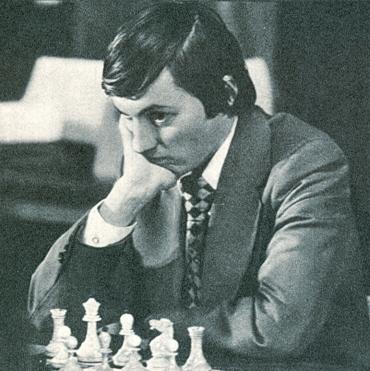
Anatoly Karpov
A remark by Larry Evans about Karpov on page 30 of the March 1986 Chess Life:
‘He will go down in history as the man who avoided a match with Bobby Fischer and then eluded him for the next ten years.’
This needs to be compared with what he wrote at the time Karpov became champion. From Chess Life & Review, November 1975, page 760:
‘Fischer refused to negotiate or compromise and his stubbornness is what killed the match – nothing or nobody else. Despite “mathematical proof” that his conditions were fairer than the old system, they were still not fair. “Fair” means no advantage to either side. All the words in the world can’t obscure that simple fact.’
And in the December 1975 issue, page 813:
‘Fischer was the best player. Seclusion has made him an unknown quantity. Karpov deserves to be world champion, and the burden is now on Fischer to prove otherwise.’
After quoting a tribute by Kasparov to Fischer, Evans comments in the March 1986 Chess Life that ‘this generous spirit was alien to Karpov’. Incredible. Karpov too has praised Fischer’s role in popularizing chess (e.g. in Chess Life, March 1983, page 11) and even observed in My Best Games, page 10, that ‘Fischer has been underestimated for a long time, in my opinion’.
(1143)
Endnote on page 266 of Chess Explorations:
In C.N. 1176 Ken Neat (Durham, England) criticized the English translation of Karpov’s My Best Games and suggested that a more reliable version of what Karpov said about Fischer was to be found on page 194 of Anatoly Karpov: Chess is My Life (Oxford, 1980).
On page 44 of the August 1986 Chess Life, Larry Evans writes:
‘To set the record straight, some readers wondered how I could criticize both Fischer’s silly title conditions (10 wins, but the champion keeps his title in case of a 9-9 tie) and Karpov’s refusal to accept those demands (see CL, March 1986, page 30). What I actually wrote about Karpov was that “he will go down in history as the man who avoided a match with Bobby Fischer and then eluded him for the next ten years”. Whether GM Karpov was right or wrong, I believe that posterity will remember him mainly for ducking Fischer – just as we remember Howard Staunton for ducking Morphy. Not once after assuming the crown did Karpov make a conciliatory gesture to lure Fischer back to chess. And, perhaps, such will be Karpov’s epitaph.
History, after all, is a harsh mistress.’
Mr Evans, we fear, is tying himself up in knots. He believes Karpov was right not to accept Fischer’s 1975 conditions but also that Karpov will be remembered for avoiding that match. And although in 1975 Mr Evans was saying that Fischer’s ‘stubbornness is what killed the match’, and although on that very page 44 of the August 1986 Chess Life he states with reference to Fischer, ‘you cannot force someone to do something against his will’, he nonetheless criticizes Karpov for failing to make a conciliatory gesture. And because (according to Mr Evans) Karpov failed to make a conciliatory gesture, that proves that Karpov ducked Fischer.
Between 1866 and 1884 (though beyond that date too) Steinitz was generally considered to be the strongest active player in the world. During that period did he make any attempt to entice the retired Morphy back into chess? We must hope to goodness that he did, or else Larry Evans will next be on the warpath against Steinitz, the man who ducked Morphy.
(1192)
C.N. 1457 pointed out that on page 10 of The Chess Beat (Oxford, 1982) Larry Evans expressed the opposite view: ‘It looks like Fischer has been ducking Karpov, not the other way around.’ (The column had appeared on, for instance, page 16 of the Reno Evening Gazette, 10 February 1979.) As noted in Chess Journalism and Ethics Larry Evans wrote in January 1988: ‘FIDE drove two Americans Reuben Fine and Bobby Fischer out of chess.’
On page 348 of the June 1979 Chess Life & Review Evans wrote: ‘Up to now Bobby has been ducking Anatoly, not the other way around.’
In Chess Life, July 1991 (page 444) he tried to reconcile his various statements by claiming that Fischer and Karpov had ducked each other:
‘Who ducked whom? This has been asked many times; they both share the blame – and so does FIDE.
... Since Fischer’s demands were the only obstacle to their match, in that sense he certainly ducked Karpov. Yet nobody knows if Fischer would have played even if he got all of his demands!
That said, Karpov ducked Fischer by refusing to play under conditions mathematically more favorable than those offered to any FIDE challenger.’
***
To summarize, Larry Evans has written:
- ‘It looks like Fischer has been ducking Karpov, not the other way around.’ (1979).
- ‘Bobby has been ducking Anatoly, not the other way around.’ (1979).
- ‘Posterity will remember [Karpov] mainly for ducking Fischer.’ (1986).
- ‘[Fischer] certainly ducked Karpov.’ (1991).
- ‘Karpov ducked Fischer.’ (1991).
Yet another similar passage by Evans:
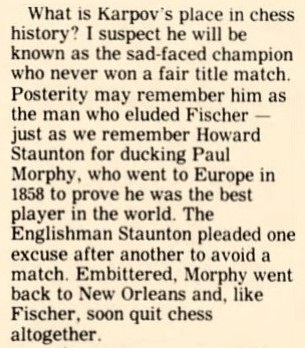
Reno Gazette-Journal, 18 April 1987, page 33
(12127)
From page 48 of Evans on Chess by Larry Evans (New York, 1974):
‘The “lapsus manus” variation derives its name from a slip of the hand made by world champion Alexander Alekhine in defense of his title.
Alekhine v Euwe, 5th match game 1935: 1 e4 e6 2 d4 d5 3 Nc3 Bb4 4 Ne2!? dxe4. Alekhine unintentionally moved his knight, sacrificing a pawn; but it turned out to be playable after 5 a3, and a new line was born.’
In fact, the ‘new line’ was already familiar, not to say famous. Alekhine played 4 Ne2 in his celebrated miniature against Nimzowitsch at Bled, 1931 – see page 94 of the second volume of his best games. There is no reason to believe it was a slip of the hand on either occasion.
Mr Evans is no doubt thinking of 1 e4 e6 2 d4 d5 3 Nc3 Bb4 4 Bd2 (Alekhine-Flohr, Nottingham, 1936), which Alekhine admitted, on page 17 of the tournament book, was a ‘lapsus manus’.
(1598)
Alekhine’s note to 4 Bd2:
‘A “lapsus manus”. I intended to play 4 P-K5 and P-B4, as, for instance, against Nimzowitsch at San Remo, 1930, but instead I made the move with the bishop first.’
Larry Evans was weak at learning:
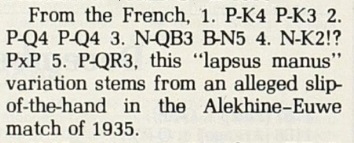
Chess Life, January 1981, page 63
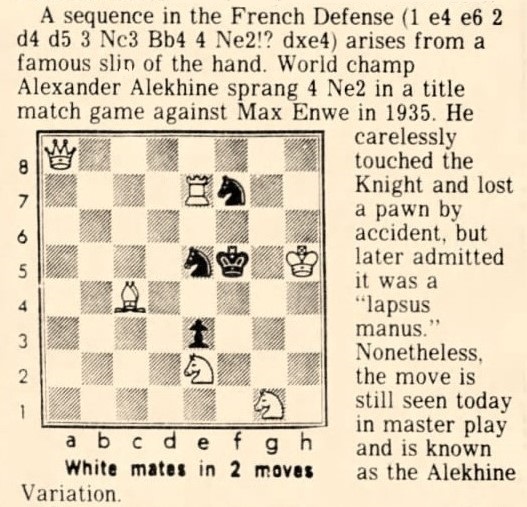
Reno Gazette-Journal, 17 March 1990, page 3F
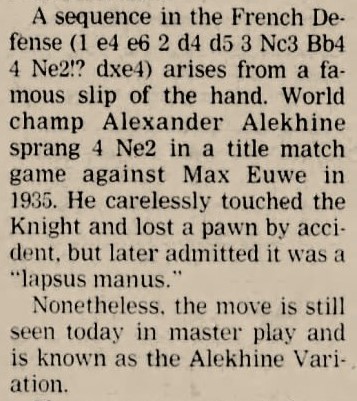
Sunday Patriot-News, 1 October 2000, page 1-13
A letter dated 2 January 1988 from Donald Schultz:
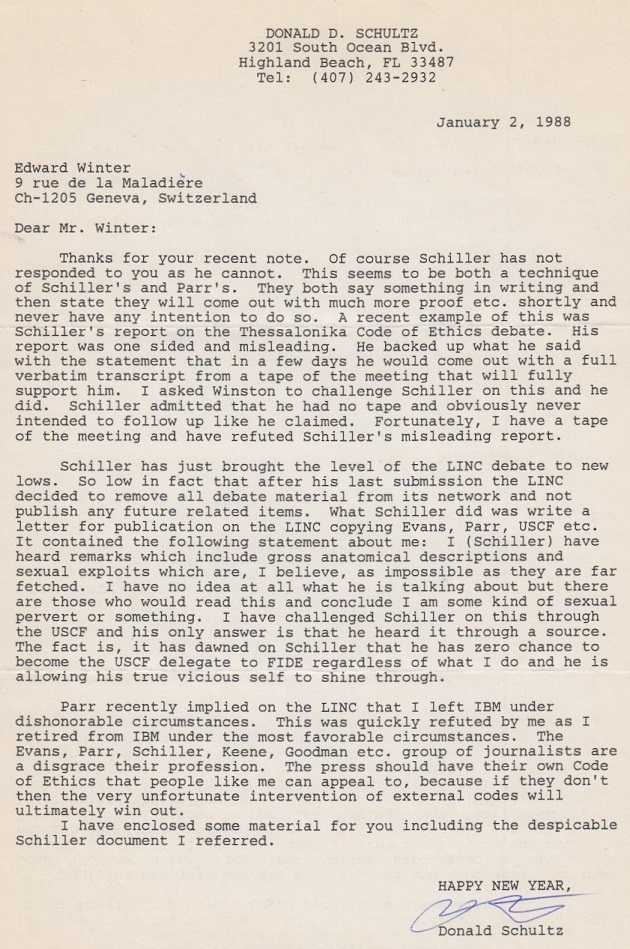
C.N. 1712 (see Chess Journalism and Ethics) quoted from a Leisure Linc article dated 15 January 1988 in which Larry Evans was addressing Donald Schultz:
‘Don, isn’t it true that your beloved FIDE is now running in the red thanks to Campo’s plunder? Campo, the man who told me in our interview that he doesn’t care about money, is now the first FIDE President in history to get a salary ($70,000) plus an expense account that would choke a cow. Didn’t Campo also stack the FIDE office with his own cronies like Dr Lim, Abundo and Miss Lagoza, his travelling companion whose salary is also paid by FIDE? (Since Campo is a married man, perhaps the less said about this the better.)
FIDE drove two Americans Reuben Fine and Bobby Fischer out of chess. And that was in the good old days before FIDE became Campo’s private cesspool.’
(1712)
In August [1988 ] Donald Schultz of the United States Chess Federation announced a multi-million-dollar lawsuit against Larry Evans for libel, slander and defamation. Throughout this year, mainly on the Leisure Linc computer system, Mr Schultz has been attacked by Mr Evans (and Mr Larry Parr) with a barbarity which, from our reading, not even nineteenth-century chess literature can match. Anyone needing to be convinced of this should see Volume I Number 2 of The Don Schultz Newsletter.
(1713)
From C.N. 1817, written in 1989 (see Rebuttals):
Sweeping awkward facts under the carpet is now a BCM speciality, though it is not, of course, the only magazine to be edited by that curious journalistic breed of half-jackal half-ostrich. A recent example of justice and fair play BCM-style: the magazine’s highly selective and inaccurate reporting in 1988 (page 385 and page 541) of criticism of Donald Schultz in the US. This has brazenly covered up the following key facts: a) many of those who had at first supported Larry Evans’s anti-Schultz ‘petition’ subsequently withdrew their names because the Grandmaster had misled them, and b) at Thessaloniki last November, virtually the full US delegation (Benjamin, Christiansen, deFirmian, Seirawan, Kudrin, Savereide, Izrailov, Teasley, Denker, Jarecki and Schiller) signed a petition in support of Schultz (‘after careful investigation we have concluded that the vicious personal attacks against him are totally without foundation’). Not a word about these facts has appeared in the BCM, whose readers have, yet again, been given an utterly false impression.
The subject of identical games is raised on page 82 of the January 1989 Chess Life, where a reader, George Gallagher, points out a pair in the Oxford Encyclopedia of Chess Games: Lasa v Jaenisch, Berlin (?) 1842 and Morphy v Löwenthal, London 1858 (page 77 and page 268 respectively).
In a slovenly reply Larry Evans, ignoring all that has appeared on the subject in C.N., adds only Marshall v Burn, Paris 1900/Mentges v Gitzen, 1933, as given on page 119 of Assiac’s The Pleasures of Chess.
If Mr Evans refuses to do his work properly, why does Chess Life keep him?
(1752)
The following item was included on pages 267-268 of Kings, Commoners and Knaves:
Larry Evans’ column in Chess Life continues to be unspeakable. In a letter dated 4 February 1989 we informed him:
‘The February “Best Question” prize is awarded to two readers who commit the blunder of attributing to Capablanca an endgame study by Troitzky, even though a correspondent pointed out in your own column (March 1974, page 199) that it was Troitzky’s composition and not the Cuban’s.
Moreover, you are wrong to congratulate the prize-winners on being “the first to find the right solution”. The complete drawing line was given in the 2/1973 Shakhmaty v SSSR and issue 32 of the endgame studies magazine EG.’
(1844)
Mr Evans ignored our request for the record to be corrected, and we therefore wrote to Chess Life:
‘... he has refused to publish a correction. The reason, according to Mr Larry Parr (USA Today Network, 2 April 1990), is that it is unimportant whether the study is attributed to Capablanca or Troitzky. I hope that you will show, by publishing the present letter, that you do not share that attitude to historical truth.’
Our letter was indeed published, on page 66 of the October 1990 Chess Life.
Below is the complete section of C.N. 1844 concerning Larry Evans:
Mr Larry Evans’ column continues to be unspeakable. In a letter dated 4 January 1989 we informed him:
‘The February “Best Question” prize is awarded to two readers who commit the blunder of attributing to Capablanca an endgame study by Troitzky, even though a correspondent pointed out in your own column (March 1974, page 199) that it was Troitzky’s composition and not the Cuban’s.
Moreover, you are wrong to congratulate the prize-winners on being “the first to find the right solution”. The complete drawing line was given in the 2/1973 Shakhmaty v SSSR and issue 32 of the endgame studies magazine EG.’
The June 1989 issue is another ‘Best Question’ botch-up by Larry Evans. What were the lifetime results of Capablanca and Alekhine?, asked Bob Peretz of Yonkers, New York. Yes, that really was the prize-winning question; the level is no higher than that.
Mr Evans replied that their tournament and match victories were a dead heat, ‘but if we count two early exhibition games in 1913, then Capa is a point ahead’. He is obviously unaware that Capablanca won both of those exhibition games.
It remains to be seen when, if ever, the ‘Grandmaster Larry Evans on Chess’ column will set the record straight.
In the May 1989 issue of Chess Life, Don Maddox announced his departure and replacement by Boris Baczynskyj. The new Editor’s most urgent priority, we venture to suggest, must be to take a long hard look at magazines such as Chess Horizons and Inside Chess, which manage to avoid insulting readers’ intelligence.
The conclusion of our first article on the Internet (1997), A Question of Credibility:
At least Messrs Wall and Crowther manage to report correctly that Alekhine died in Portugal. Even that feat has proved beyond a famously untrustworthy writer, Larry Evans, in his misnamed column ‘All about Alekhine’ (to be found at the same Chessmaster Network site). He bafflingly asserts that Alekhine died ‘in Madrid’. By normal standards a laughable blunder, but for Mr Evans a routine lapse. In a recent article ‘Alekhine’s Last Days’ in the same source, he contradicted himself, saying that Alekhine died ‘in Lisbon’. That too needs correction, but at least it is the right country.
Another article on the ‘Chessmaster Network’ has Larry Evans putting forward his classification of ‘The Ten Best Players of All Time’. The penultimate name is Botvinnik, who, he informs us, died in 1994. Actually it was 1995. Then comes Tal, believed by Mr Evans to have died in 1991. The correct year is 1992.
And so it is that people possessing only minimal acquaintance with the world chess champions’ careers consider themselves qualified to recount them, rank them and ridicule them. Whether on the Web or in books and magazines, all too many shoddy writers treat the greats of yesteryear with contempt, yet willingly defend or shield the reprobates of today. Our intention is to do the opposite.
Responding to a call from George Jelliss for the shortest game ending with mate by queen’s side castling, in C.N.s 391 and 462 Michael McDowell gave:
a) 1 e4 d5 2 exd5 Qxd5 3 Ke2 Bf5 4 Ke3 Qe6+ 5 Kd4 Na6 6 c3 O-O-O, andb) 1 c4 d5 2 d4 Kd7 3 Bf4 Ke6 4 e3 Kf5 5 Ne2 Ke4 6 Qd3+ Kxd3 7 Nbc3 dxc4 8 O-O-O mate.
Mr McDowell has now found a slightly shorter solution for the first task (where mate is possible by a rook move alone, without involving the king): 1 d4 d6 2 Na3 Kd7 3 Bf4 Kc6 4 Qd3 Kd5 5 Qf5+ Kxd4 6 O-O-O mate.
(2079)
The preceding item was published in 1995. Naturally Mr Larry Evans ignored it when, on page 41 of the December 1996 Chess Life, he congratulated a reader on submitting a constructed game which was almost identical to the final one above.
Mikhail Tal died in 1992, but even reporting that elementary fact has proven an insurmountable hurdle for a number of writers. Other years proposed include:
1991: Larry Evans on the ‘Chess master Network’ (Internet).
1993: Graham Burgess on page 496 of The Mammoth Book of Chess.
1994: Bjarke Kristensen and Don Maddox on page 19 of their book about the Kasparov v Anand match.
Not to be outdone, pages 50 and 368 of World Champion Openings by Eric Schiller refer to a game ‘Unzicker v Tal, Hamburg, ... 1996’.
(2240)
Postings at the Chess Café’s Bulletin Board in 2001 (most notably by Paul Kollar) pointed out many passages published under Larry Evans’ name which were identical or similar to what had appeared in books by Lasker, Réti, Reinfeld and Fine.
(2971)
On 17 February 2002 Dale Brandreth (Yorklyn, DE, USA) wrote to us:
‘As far as Evans and Parr are concerned, I think what it basically comes down to is that both have some sort of delusions that they know something of chess history, whereas in truth they both know very little. Thus the only real defense they have is scurrilous attacks on those who point out their absurd errors. Schiller belongs to the same slovenly group.
Nothing would surprise me about the USCF. Although I have known some good people in lesser positions there over the years, the people who have the power there are generally little better than guttersniping thieves out to enrich themselves at the expense of the USCF. Note their constant turnover. The publication has been a sorry rag for years and every time they start to improve it, some of their idiotic people ruin it again.’
Addition on 21 July 2024:
We offer a neologism to describe Larry Evans and Larry Parr: bunkmonger.
Nearly two decades ago, in C.N. 700, we reported from our reading of Europe Echecs:
‘A hoaxer, named as Jean-Marie Morisset of Rouen, is at work, creating spurious games claimed to have been played by various ‘celebrities’ (Delius, the Pope, etc.).’
The deception, uncovered by Marc Durand, was written up in a number of magazines at the time, and a feature on pages 192-193 of the May 1984 BCM quoted a sentence from a long letter of apology from J.-M. Morisset: ‘J’espère que vous me pardonnez mon impudence’.
The hoaxes concerned various invented games and problems, the most notorious specimen being a 1946 game between the future Pope John Paul II and ‘Wanda Zartobliwy’. It emerged that ‘Zartobliwy’ is the Polish word for ‘facetious’ or ‘jocose’.
For further information, readers are referred to page 17 of The Even More Complete Chess Addict by M. Fox and R. James (London, 1993) and, in particular, the article ‘No Chess in the Vatican’ by Tomasz Lissowski on pages 306-310 of the Winter 2000 issue of the Quarterly for Chess History. The Quarterly published a follow-up piece on pages 366-367 of its Spring 2001 issue. For Hans Ree’s account of the trickery, see pages 76-77 of the 3/2001 New in Chess.
Of course, the hoax has become so well known that no competent chess writer would fall for it today.
(3118)
Larry Evans fell for it on page 44 of Chess Life, January 2004.
C.N. 3118 referred to the old claims regarding Pope John Paul II and chess, pointing out that they had frequently been exposed as a hoax. An early case of exposure was on pages 192-193 of the May 1984 BCM, and two decades later even Larry Evans caught on. From page 6 of the Winter 2004 Chess Life:
‘Although widely quoted in many other sources, apparently the problem and game attributed to Pope John Paul II in my column last January is [sic] a hoax.’
(3696)
Regarding Harry Golombek’s book on the 1948 world championship match-tournament in The Hague and Moscow, the following untrue statement is quoted on page 42 of the December 2004 Chess Life:
‘The author of this book was on the spot throughout and at the very epicenter of all the action.’
In reality, Golombek was not present in Moscow at all, as he explained in his introduction to the 1982 BCM edition of the book:
‘The time came when the event moved off to Moscow. I endeavoured to follow the big group of Dutch and Russian chess masters and officials but was unable to gain a visa. [H.G. then gave further details.]
So I had to be content with studying the games of the Russian section of the tournament in the Soviet bulletins. Fortunately, these were very well annotated and there were also quite elaborate descriptions of the playing hall and the various circumstances that attend a great tournament.’
(3482)
C.N. 3851 referred to Zukertort’s famous brilliancy against Blackburne at London, 1883, and now we note that on page 45 of the August 2005 Chess Life a reader of the ‘Evans on Chess’ column asserts:
‘Everyone, and I do mean everyone, gives 31 Bxe5+ an exclam, yet about 30 years ago I found a significant improvement’ [i.e. a forced mate in seven beginning with 31 Rg8+].
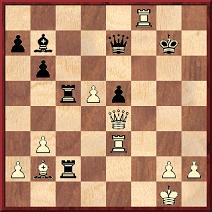
C.N. 2193 (see page 97 of the 5/1998 New in Chess and page 5 of A Chess Omnibus) pointed out that the forced mate with 31 Rg8+ was given by Edgard Tchélébi on page 60 of the March 1957 BCM.
We look forward to Tchélébi being accorded proper credit. And on the subject of necessary corrections in Chess Life, C.N. 3482 drew attention to an untrue statement about Golombek written by Raymond Keene and unquestioningly quoted by Larry Evans on page 42 of his December 2004 column.
(3864)
A quote from page 26 of Evans on Chess by Larry Evans (New York, 1974):
‘... Richard Reti, who in 1919 startled the chessworld by announcing that “White’s game is in its last throes” after 1 P-K4.’
(6264)
From page 88 of Chess Beginner to Expert by Larry Evans (Wellesley Hills, 1967):
‘Breyer once began annotating a game by: “1 P-K4?” His terse comment, “White’s game is in its last throes!”’
See also Breyer and the Last Throes.
‘The Cuban world champion José Capablanca admitted that he learned only from his losses.’
Source: Evans on Chess by Larry Evans (New York, 1974), page 17.
‘... from few won games have I learned as much as I have from most of my defeats.’
Source: Author’s note in My Chess Career by J.R. Capablanca (London, 1920) and quoted on page 40 of Evans on Chess.
(6268)
Concerning the ‘Lucena Position’, we note:
Page 291 of Basic Chess Endings by Reuben Fine (Philadelphia, 1941).
Page 42 of Championship Chess and Checkers for All by Larry Evans and Tom Wiswell (New York, 1953).
(6786)
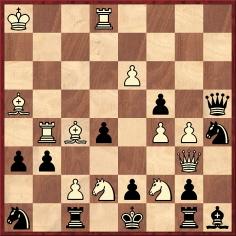
Mate in three
This problem appeared with the reference ‘A. Ancin, Czechoslovakia’ on page 275 of the May 1971 Chess Life & Review, in the ‘Benko’s Bafflers’ column. The key move is 1 Nf1, and Pal Benko gave the full solution on page 315 of the June 1971 Chess Life & Review.
The composition was subsequently taken up in ‘Larry Evans on Chess’ on page 647 of the November 1971 issue. That item is reproduced here without comment:
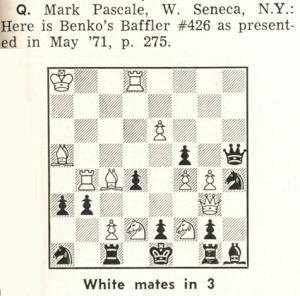
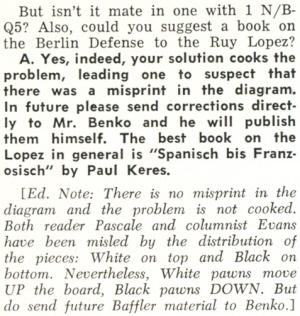
(7229)
From page 6 of The Chess Beat by L. Evans (Oxford, 1982), regarding the 1974 Candidates’ quarter-final match in Moscow:
‘To the surprise of nobody, young Karpov romped over his countryman Lev Polugaievsky 5½-2½.’
C.N. 324 quoted that statement, together with another one by Evans on the next page:
‘Bobby [Fischer] told friends he was surprised that Karpov beat Polugaievsky ...’
(7723)
On page 34 of the February 1935 Chess Review Irving Chernev wrote in a ‘Curious Chess Facts’ column:
‘Rubinstein, playing a rook ending against Mattison, extracted a win from such a “hopelessly drawn” position that the editors of the tourney book united in the assertion that had this occurred 300 years ago, Rubinstein would have been burned as being in league with evil spirits.’
Chernev used a slightly different wording on page 58 of his book Curious Chess Facts (New York, 1937):
‘Rubinstein, playing a rook and pawn ending against Mattison, extracted a win from such a “hopelessly drawn” position that the editors of the tournament book united in the assertion that had this happened 300 years ago, Rubinstein would have been burned at the stake for being in league with evil spirits.’
Below are three instances of Chernev’s text being copied (without attribution, of course):
‘At Carlsbad, 1929 Rubinstein extracted a win from such a “hopelessly drawn” rook and pawn ending that the editors of the tournament book united in the assertion that had this happened 300 years ago Rubinstein would have been burned at the stake for being in league with evil spirits.’
Source: page 15 of New Ideas in Chess by Larry Evans (New York, 1958).
‘At Carlsbad, 1929 Rubinstein extracted a win from such a “hopelessly drawn” rook-and-pawn ending that the editors of the tournament book united in the assertion that had this happened 300 years earlier Rubinstein would have been burned at the stake for being in league with evil spirits.’
Source: page 133 of Chess Catechism by Larry Evans (New York, 1970).
‘At Carlsbad, 1929 Rubinstein extracted a win from such a “hopelessly drawn” rook-and-pawn ending that the editors of the tournament book united in the assertion that had it happened 300 years ago he would have been burned at the stake for being in league with evil spirits.’
Source: pages 19-20 of Modern Chess Brilliancies by Larry Evans (New York, 1970).
(7811)
Another one:
‘At Carlsbad, 1929 Rubinstein extracted a win from such a “hopelessly drawn” rook-and-pawn ending that the editors of the tournament book united in the assertion that had it happened 300 years ago he would have been burned at the stake for being in league with evil spirits.’
Source: page 33 of The Chess Beat by Larry Evans (Oxford, 1982).
From pages 190-191 of New Ideas in Chess by Larry Evans (New York, 1958), as well as pages 180-181 of the New York, 1969 edition:

The highlighted sentence has been lifted without credit from Emanuel Lasker’s Manual. See, for instance, page 262 of the New York, 1927 edition:
‘On the Chess-board lie and hypocrisy do not survive long. The creative combination lays bare the presumption of a lie; the merciless fact, culminating in a checkmate, contradicts the hypocrite.’
C.N. 8215 quoted a remark by Reuben Fine on page 195 of the June-July 1943 Chess Review: ‘In such positions combinations are as natural as a baby’s smile.’
In a supplement (‘Abracadabra Chess’ by Larry Evans) to the Fall 1962 issue of the American Chess Quarterly the following appeared on page 333, concerning Morphy v the Duke and Count:
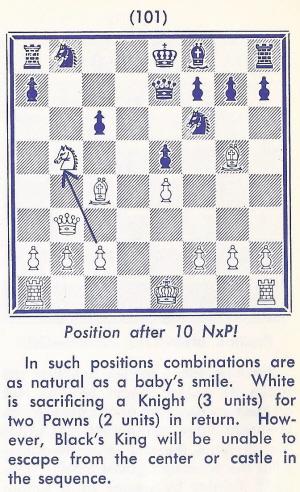
Evans had a habit of lifting other writers’ bons mots and prose for presentation as his own. For example, on page 71 of Guide to Good Chess (Sydney, 1950) C.J.S. Purdy wrote:
‘Pawn endings are to chess what putting is to golf, with the big difference that they do not occur in every game.’
Two misappropriations:
L. Evans, on page 270 of Chess Life & Review, May 1970.
L. Evans, on page 29 of Evans on Chess (New York, 1974).
... On page 34 of The Chess Beat (Oxford, 1982) the same Larry Evans wrote that Reuben Fine’s Basic Chess Endings was ‘riddled with errors’ and proclaimed:
‘The essential problem is that opinions are often copied uncritically and perpetuated in the textbooks. Error is passed from hand to hand, like a torch.’
(8221)
Among the many chess oddities on the English-language Wikipedia site are a disproportionately long, though interesting, entry on Grace Alekhine and a Fischer-related page whose three-line section on My 61 Memorable Games ends:
‘Larry Evans originally thought it was possible that it was a pirated version of a genuine Fischer manuscript, but in April 2008 concluded it was a hoax.’
Mr Evans asserted that the 1995 Batsford edition of My 60 Memorable Games was better than the original (see Fischer’s Fury), and there can hardly be value in chronicling what such an individual may have originally thought was possible, or what he later concluded, about My 61 Memorable Games, a book which he never even saw.
(8130)
C.N. 9190 reiterated this point.
Page 42 of Evans on Chess by Larry Evans (New York, 1974):
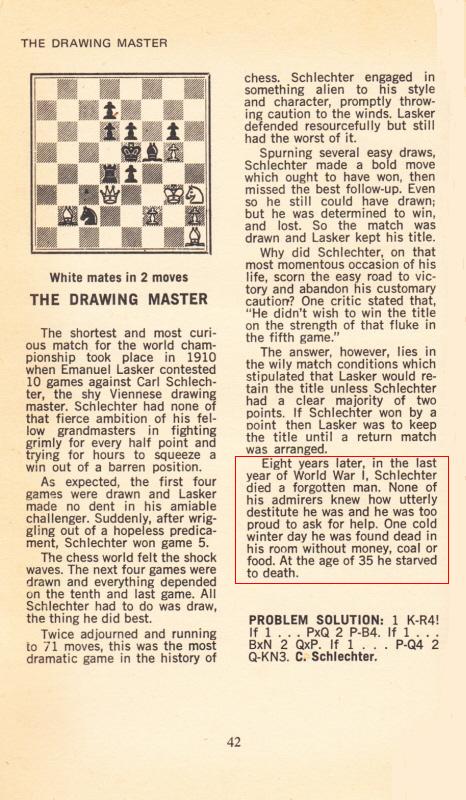
As regards the final paragraph, at the time of his death, in late
December 1918, Schlechter was by no means ‘forgotten’; he was the
Editor of the Deutsche Schachzeitung and in
September-October 1918 had participated in a double-round
tournament in Berlin with Lasker, Rubinstein and Tarrasch. His
death occurred not ‘in the last year of World War I’ but after the
War was over. Nor was he found dead alone in his room at home
(which would mean in Vienna); he died in hospital in Budapest. The
cause of his death is uncertain. He was then aged 44, not 35.
That syndicated column by Evans, riddled with errors though it was, was still appearing in newspapers nearly 15 years after its first publication (on, for instance, page D27 of the Chicago Tribune, 3 May 1987), without even a correction of Schlechter’s age.
Nor, of course, was there ever an admission that the article was heavily reliant on a piece about Schlechter by Heinrich Fraenkel published on pages 50-53 of Chess Treasury of the Air by Terence Tiller (Harmondsworth, 1966) and reprinted on pages 5-6 of the January 1970 Chess Digest. Below is the final paragraph from the book:
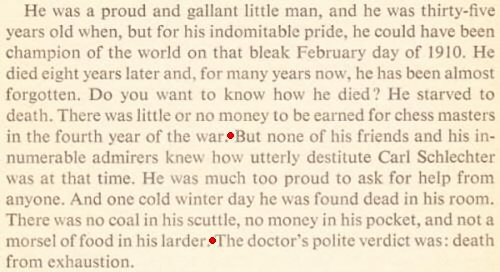
It is obviously unwise to rely on such material without independent corroboration, but Evans relied on it without even reading it properly. Fraenkel stated, correctly, that Schlechter was aged 35 at the time of the match against Lasker, and not when he died, and he referred to Schlechter being almost forgotten ‘for many years now’ (i.e. from the standpoint of the mid-twentieth century), and not at the time of his death.
Despite cribbing from Fraenkel, Evans contradicted him concerning the terms of the Lasker v Schlechter match (for Fraenkel was the ‘critic’ mentioned anonymously three paragraphs from the end of Evans’ article). He also wrote simplistically and categorically about the match on page 49 of The Chess Beat, again with no apparent understanding of what is one of the most complex puzzles in chess history. It is not by chance that criticism of Evans’ published output increased during his later years, as he eschewed writing about chess play (in which he held the grandmaster title) and preferred writing about chess history, lore and politics (in which he held himself up to ridicule).
On pages 45-50 of Carl Schlechter! Life and Times of the Austrian Chess Wizard (Yorklyn, 1994) Warren Goldman discussed Schlechter’s demise in detail, noting that possible causes of death were lung disease aggravated by lack of proper nutrition, tuberculosis, pneumonia and the Spanish flu epidemic. On page 46 he wrote:
‘Published accounts concerning the medical details are fragmentary and do not allow a firm conclusion as to the precise cause of death.’
Pages 428-452 of the Goldman book sifted the evidence regarding the conditions for the 1910 Lasker v Schlechter match. Again, no definitive conclusions could be offered.
That is how proper writers (not only historians, of course) work. When they know, they explain why they know. When they are uncertain, they explain why they are uncertain. When they do not know, they either say that they do not know or they say nothing. That is honest writing which treats the reader with respect, and there is no other kind worth doing.
(8222)
The space-filling potential of the smoking-threat anecdote involving Nimzowitsch and a variable supporting cast (Lasker, Vidmar, Tartakower, Bogoljubow, Maróczy and Lederer) is a godsend for a certain type of ahistorical chess author. He may even decide to write a playlet:
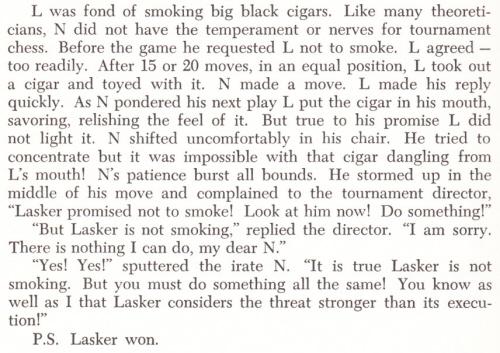
Source: page 86 of Chess Beginner to Expert by Larry Evans (Wellesley Hills, 1967).
(8249)
On page 26 of the April 2004 Chess Life Larry Evans wrote:
‘“So it’s to be Short and it will be short”, quipped Kasparov upon learning the name of his challenger (who eliminated Anatoly Karpov and then Jan Timman, to reach the top).’
In reality, the famous quip was made by Kasparov during the Manila Olympiad in June 1992, long before the Short v Timman Candidates’ final (which ended on 30 January 1993).
(8376)
For further particulars, see the remainder of C.N. 8376, as well as C.N.s 9221 and 9251.
As noted in C.N. 2104 (see page 230 of Kings Commoners and Knaves), the introduction by Larry Evans to the eighth game in Fischer’s My 60 Memorable Games began:
‘Alekhine said, in his prime, that to wrest a point from him it was necessary to win the same game three times: once at the beginning, once in the middle, once at the end.’
A further citation, given in C.N. 9029:
‘... Alekhine’s boast that to lose he had to be beaten three times – once in the opening, once in the middle game, once in the ending.’
Source: page 209 of New Ideas in Chess by L. Evans (Las Vegas, 2011).
The matter was also discussed in C.N.s 3896, 3898 and 10416. In the last of these we commented:
For the suggestion that Alekhine made the remark about himself no reliable source has been found. There are only the unsubstantiated assertions of Larry Evans.
A footnote on page 230 of Kings, Commoners and Knaves:
On pages 45-48 of the January 1997 CHESS we scrutinized the Batsford re-write of Fischer’s book, which took many hundreds of unjustified liberties with Fischer’s prose. For Mr Larry Evans’ risible response, see pages 3-4 of Inside Chess, 31 March 1997. The magazine decided to print nothing further on the subject, on the grounds that our exchange with Mr Evans had already ‘made him look a fool’. [Communication to us from Yasser Seirawan.]
From page 81 of the February 1971 Chess Life & Review (‘Larry Evans on Chess’):
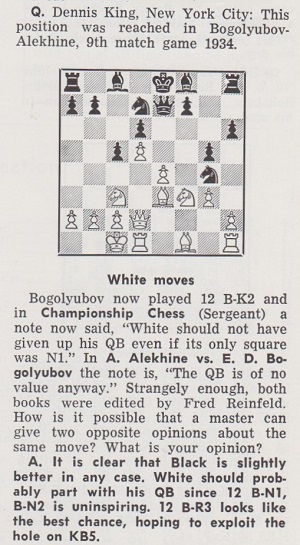
It was hardly justified for Dennis King to assert that Reinfeld gave ‘two opposite opinions’ on White’s 12th move. Concerning P.W. Sergeant’s Championship Chess (London, 1938), Reinfeld brought out updated editions (New York, 1960 and 1963), with extra games but without revising Sergeant’s annotations. The other book, A. Alekhine vs. E.D. Bogoljubow (Philadelphia, 1934), was co-written by Reinfeld with Reuben Fine.
Such points passed Evans by, and his cursory remark that 12 Bh3 ‘looks like the best chance’ did not mention that the move was recommended by Bogoljubow, though not by Alekhine.
Below is a non-exhaustive compendium of notes to Bogoljubow’s 12th move (after 1 d4 c5 2 d5 e5 3 e4 d6 4 f4 exf4 5 Bxf4 Qh4+ 6 g3 Qe7 7 Nc3 g5 8 Be3 Nd7 9 Nf3 h6 10 Qd2 Ngf6 11 O-O-O Ng4):
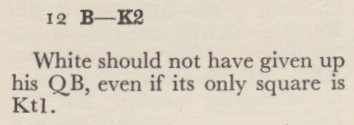
Championship Chess by P.W. Sergeant (London, 1938), page 192

A. Alekhine vs. E.D. Bogoljubow by F. Reinfeld and R. Fine (Philadelphia, 1934), page 28

Schachkampf um die Weltmeisterschaft by E. Bogoljubow (Karlsruhe, 1935), page 56
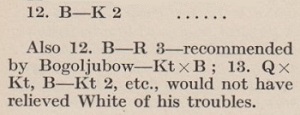
My Best Games of Chess 1924-1937 by A. Alekhine (London, 1939), page 140

Alekhine vs. Bogolubow by I.A. Horowitz and S.S. Cohen (New York, 1934), page 13

Deutsche Schachzeitung, May 1934, page 146 (annotator: M. Blümich)
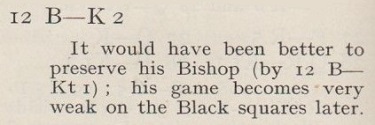
BCM, June 1934, page 264 (annotator: J.H. Blake)

Alexander Alekhine II Games 1923-1934 by A. Khalifman (Sofia, 2002).
Some annotators made no comment on 12 Be2, examples being Lasker in his match-book (page 38), Kmoch on page 146 of the May-June 1934 Wiener Schachzeitung and Tartakower on page 551 of L’Echiquier, 8 August 1934.
The game was played in Pforzheim on 25 April 1934. Page 55 of Bogoljubow’s above-mentioned match-book gave the players’ times as two hours and 41 minutes for White and 58 minutes for Black. See too pages 96-97 of Wonders and Curiosities of Chess by I. Chernev (New York, 1974).
(9116)
C.N. 9218 reported a denial by Fischer, although not from a primary source, that he had ever claimed an ability to give knight-odds to any woman in the world. The claim was attributed to him in the Ginzburg interview (C.N. 9155), and below is the alleged exchange between Ginzburg and Fischer, on page 50 of Harper’s Magazine, January 1962:
‘“Lisa Lane has said – and lots of other people agree – that you’re probably the greatest chess player alive.”
“That statement is accurate, but Lisa Lane really wouldn’t be in a position to know. They’re all weak, all women. They’re stupid compared to men. They shouldn’t play chess, you know. They’re like beginners. They lose every single game against a man. There isn’t a woman player in the world I can’t give knight-odds to and still beat.”’
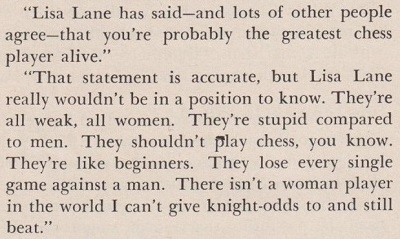
Whether or not Fischer spoke those words, or anything similar, they have been widely disseminated, and the name of Nona Gaprindashvili has somehow been drawn in. Below are three passages written by Larry Evans:
‘Why, of [sic] why, are there no lady grandmasters?
This tedious topic was kicked around long before Bobby Fischer proclaimed: “Women are weakies. I can give knight odds to any woman in the world. To Nona even, a knight!” Russia’s Mikhail Tal politely demurred: “Fischer is Fischer, but a knight is a knight!”’
Source: a syndicated column by Evans published in, for instance, the Sunday Oregonian, 2 December 1973, page F3.
‘Bobby Fischer probably regrets ever saying: “They’re all weak, all women. They’re stupid compared to men. They shouldn’t play chess, you know. They’re like beginners. They lose every single game against a man. There isn’t a woman player in the world I can’t give knight-odds to and still beat ... To Nona even, a knight!”’
Source: a syndicated column by Evans published in, for instance, the Oregonian, 15 March 1976, page B6, and reproduced on page 71 of Evans’s book The Chess Beat (Oxford, 1982).
‘... Bobby Fischer’s boast over 30 years ago that he could give a knight to any woman – even world champ Nona Gaprindashvili. “Fischer is Fischer. But a knight is a knight”, pooh-poohed Mikhail Tal.’
Source: Chess Life, February 1995, page 17.
In a discussion of the Harper’s Magazine interview on page 361 of Impact of Genius (Seattle, 1992) R.E. Fauber wrote:
‘He denounced “girls” as “silly” and branded them “weakies”. He offered to give knight odds to any female chess players. The Soviets joined in the general hilarity by offering to pit newly-crowned women’s world champion Nona Gaprindashvili against him, at those odds. Fischer did not respond.’
We offer some factual observations:
1) The word ‘silly’ is not in the Ginzburg interview. The word ‘weakies’ is on page 51, but in a different context, i.e. not specifically about females who play chess:
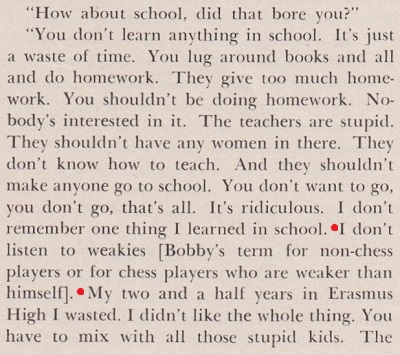
2) The words attributed to Fischer by Ginzburg were not an ‘offer’ to give knight odds but a claim that (hypothetically or theoretically) he could give such odds;
3) Nona Gaprindashvili was not mentioned in the Harper’s Magazine interview, and at that time she was not ‘newly crowned’ (Fauber) or ‘world champ’ (Evans). She did not win the women’s world championship title until October 1962, about nine months after publication of the interview.
On page 367 of the December 1963 Chess Review Petar Trifunović wrote:
‘Someone once asserted to the writer that women’s chess is very weak, declaring as proof that Bobby Fischer said he can give knight odds to the women’s champion. The writer doesn’t know that Fischer said anything of the sort, but is sure no-one can give knight odds to Nona Gaprindashvili.’
Chess Review added an editorial footnote:
‘Some years ago a magazine article did quote Fischer to that effect. But he has said he was improperly quoted on many points, out of context or otherwise. Certainly, he did not mention Nona Gaprindashvili as she was not then women’s champion.’
4) We do not know where and when Mikhail Tal may have made the remarks ascribed to him.
5) During the second match between Fischer and Spassky, 30 years after the Ginzburg interview, Fischer was asked about women’s chess by Cathy Forbes at the fifth press conference, on 5 October 1992. Below is the exchange, as transcribed on page 152 of No Regrets by Yasser Seirawan and George Stefanovic (Seattle, 1992):
Forbes: ‘Why, in your opinion, do women generally not play chess as well as men?’
Fischer: ‘Well, it seems to be nature, but perhaps with time they are improving and I assume that they will continue to improve.’
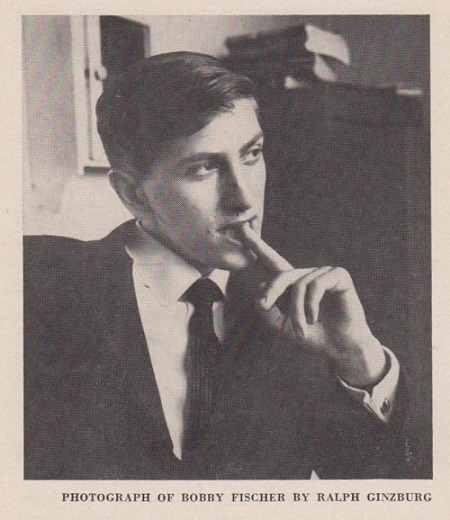
From Harper’s Magazine, January 1962, page 52
(9253)
From a syndicated column (19 November 2000) by Larry Evans:
‘“His best books are those with hardly any words at all, but only diagrams, captions and solutions”, quipped a wag about Fred Reinfeld, the world’s most-prolific chess author.’
Evans did not bother to give a source or to name the ‘wag’.
The remark was by C.J.S. Purdy, on page 120 of the July-August 1967 Chess World. The passage can also be found on page 67 of The Search for Chess Perfection II by C.J.S. Purdy (Davenport, 2006) and on page 149 of The Chess Gospel According to John edited by R.J. Tykodi and Bob Long (Davenport, 2010).
In isolation and out of context, the words extracted by Evans give a false impression of Purdy’s view of Reinfeld as a chess writer. See, for instance, C.N. 9586.
(9614)
From page 159 of Chessboard Magic! by Irving Chernev (New York, 1943):
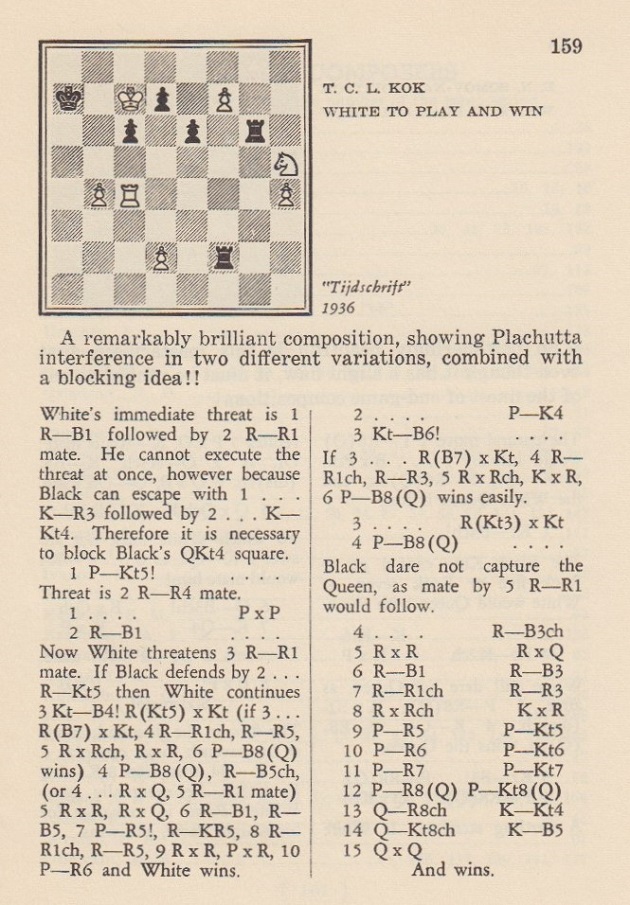
Part of the text is very similar to what appeared in an article by the composer, Theodorus Cornelis Louis Kok, on page 61 of the March 1937 Chess Review, translated from page 134 of the May 1936 Tijdschrift van den Koninklijken Nederlandschen Schaakbond:
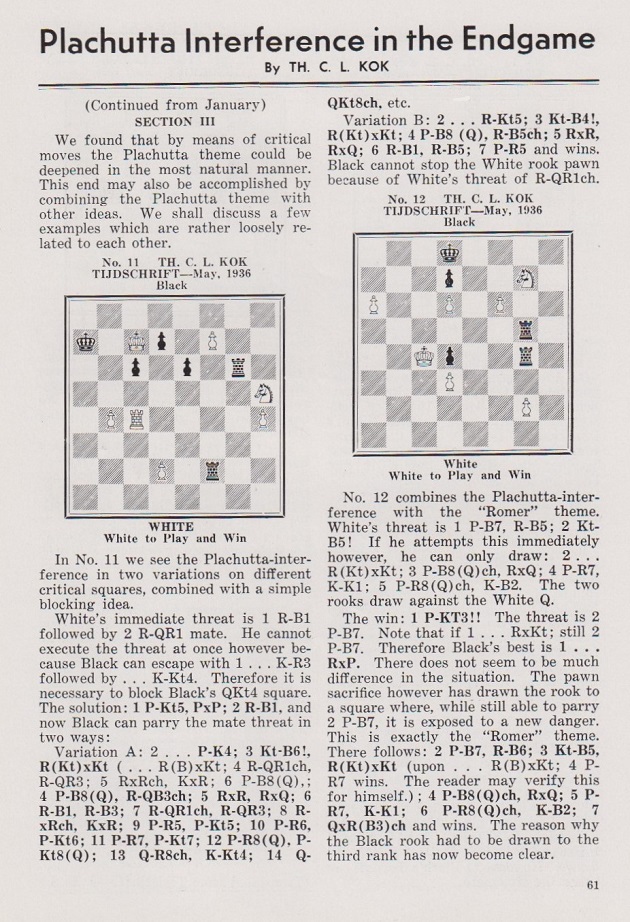
On page 50 of the March 1987 Chess Life a reader, Jeff Moran, made a contribution to the ‘Grandmaster Larry Evans on Chess’ column:
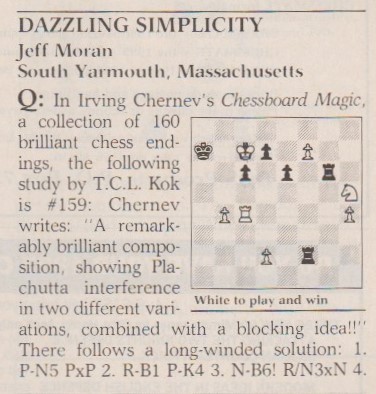
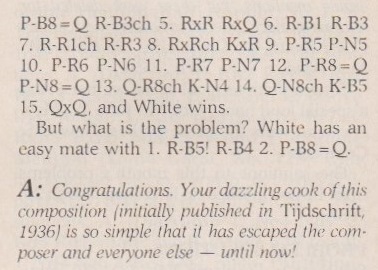
When subsequently writing to Larry Evans with other factual corrections to his column, we informed him:
‘To revert to an older matter: the 1936 endgame study by Kok on page 159 of Chernev’s Chessboard Magic!. In the March 1987 Chess Life you congratulated a reader thus: “your dazzling cook ... is so simple that it has escaped the composer and everyone else – until now!” Not so. The identical cook was given by W. Wren on page 188 of Chess World, 1 August 1950.’
Below is what had appeared in Purdy’s magazine:
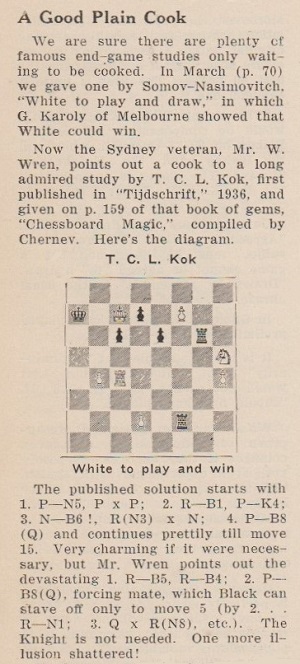
Our above-mentioned letter (5 October 1990) was answered by Evans as follows (letter dated 23 October 1990):
‘Although the cook to Chernev’s Chessboard Magic may have been pointed out in a relatively obscure journal way back in 1950, it in no way invalidates the reader’s rediscovery. This correction never appeared before in Chess Life, which is the important point.’
We replied to Evans (2 November 1990) that a correction was clearly required in Chess Life, so that due credit was given to W. Wren and Chess World, but in a further letter (12 November 1990) Evans remained intransigent:
‘If I decide that a reader made a certain discovery on his own, then I don’t care where it first appeared. In chess, as in most other fields, not much is new under the sun anyway.’
He added some irrelevant denigration of C.J.S. Purdy:
‘... the relatively obscure Australian magazine Chess World (which probably never reached 1,000 subscribers) edited by a minor master to whom I could have given pawn and move ... If you care to place a wager – with the loser to pay for the cost of a poll – I maintain that not ten in a thousand subscribers to Chess Life have ever heard of or seen a copy of Purdy’s Chess World, which they would probably confuse with Frank Brady’s short-lived periodical.’
We responded to him on 30 November 1990:
‘Your attempts to introduce extraneous and erroneous arguments (such as the playing strength of Purdy and the alleged “obscurity” of Chess World, which, by the way, the latest New in Chess calls “a magazine highly esteemed both in Australia and abroad”) are futile.
... With regard to the Kok composition, I find your proposal of a wager childish, but, if you really want one, it must of course be on the central issue. Please therefore indicate whether you are prepared to accept Chess Life readers’ verdict on the following facts:
a) In the March 1987 Chess Life you said that a reader’s “dazzling cook ... is so simple that it has escaped the composer and everyone else – until now!”
b) I refuted these words by pointing out that the identical cook was published in Chess World, 1 August 1950.
c) You nonetheless claim that there is no reason to correct the record in Chess Life.
d) I say that a correction needs to be printed.’
And that was that. There was nothing more from Evans, and we do not know whether his insulting words about Purdy and Chess World reflected his real view or whether he was merely lashing out to divert attention from his failure to conduct the ‘Grandmaster Larry Evans on Chess’ column accurately and fairly.
The bust regarding the Kok study was also mentioned by Gerry Dyer on page 665 of the December 1994 BCM, in K. Whyld’s Quotes and Queries column. Again, it was not realized that 1 Rc5 had been discovered long ago.
(9639)
From the ‘Larry Evans on Chess’ column on page 208 of Chess & Review, April 1971:
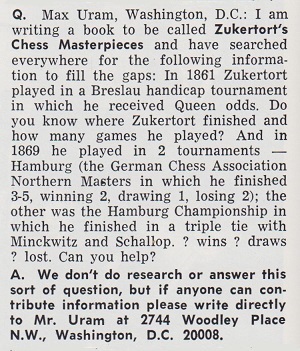
(9967)
In addition to Evans’ above statement ‘we don’t do research’, another drawback was admitted on page 25 of his book The Chess Opening for You (New York, 1975):
‘I have a terrible memory ...’
Evans’ copying of faulty material by Soltis about the word ‘Resigns’ in other languages was discussed in C.N.s 10233 and 10249.
For another example of misguided copying by Evans, see A Mieses-Schottländer Chess Story.
Larry Evans was dismissed as a Chess Life columnist in 2006. Termination of the ‘Larry Evans on Chess’ column was announced curtly on page 3 of the June 2006 Chess Life.
Apish ‘tributes’ to Bobby Fischer on page 21 of Chess Life, March 2008:
‘He was the pride and sorrow of chess.’ (Raymond Keene)
‘Chess was his native tongue.’ (Larry Evans).
(11059)
Sean Robinson (Tacoma, WA, USA) notes that Larry Evans also mentioned Fischer’s verification of Modern Chess Brilliancies on page 1 of its 1994 algebraic edition (‘Fischer ... who reviewed this manuscript in 1969 before it went to press when he was a guest at my home in Reno’). There was no word about the review being performed blindfold. The 1970/71 book did not mention any involvement by Fischer.
The algebraic edition also reproduced, on pages 3-14, Evans’ Introduction to the original book. Although dated August 1969, it referred, on page 11, to ‘the stolid grinders like Smyslov, Petrosian, Karpov and Spassky’. Karpov’s name had naturally been absent from the 1970/71 book.
Comparing Modern Chess Brilliancies with Fischer’s My 60 Memorable Games (New York, 1969), our correspondent remarks that the books have 13 games in common, and he provides these extracts from the introductions:
My 60 Memorable Games (page 18, under the heading ‘Slaying the dragon’): ‘In a laudable attempt to create complications, Larsen deviates from the book on move 15. ... an object lesson in how to mount an assault against the fianchettoed king.’
Modern Chess Brilliancies (page 198): ‘Fischer slays the Dragon Variation after an ill-advised attempt on the part of his opponent to complicate. The result is an object lesson in how to mount an assault against the fianchettoed king.’
My 60 Memorable Games (page 137): ‘ ... Fischer causes the overextended White center to crumble. Letelier, busily engaged on a material hunt, neglects to safeguard his rear ... Fischer rapidly encircles the hapless monarch and, with a startling queen sacrifice, induces abdication.’
Modern Chess Brilliancies (page 73): ‘White overextends his center in his hunt for material and neglects to safeguard his rear. His hapless monarch, unable to castle, is soon forced to abdicate.’
My 60 Memorable Games (page 187): ‘This draw has the charm of perfection. ... The economy and ingenuity displayed by both players produces [sic] a harmonious flow of movement, remarkable in its esthetic appeal.’
Modern Chess Brilliancies (page 74): ‘This draw has the charm of perfection. The timing and ingenuity displayed by both players produce a harmonious flow of movement, remarkable in its aesthetic appeal.’
My 60 Memorable Games (page 212): ‘... Bolbochan, burdened with a bad bishop against a good knight, defends with extreme care but is gradually forced to retreat behind his lines. ... Fischer’s invasion on the weakened squares is a model of accuracy. It culminates in a keen combination which, appropiately [sic], earned a tie for the first brilliancy prize.’
Modern Chess Brilliancies (page 196): ‘Burdened with a bad bishop against a good knight, Black defends with extreme care but is gradually forced to retreat behind his lines. Fischer’s invasion on the weakened squares is a model of accuracy, culminating in a keen combination.’
For our part, we have compared these passages with My 61 Memorable Games, which often made irrational textual changes. One example:
My 60 Memorable Games (page 137): ‘Letelier, busily engaged on a material hunt, neglects to safeguard his rear.’
My 61 Memorable Games (page 252): ‘Letelier continues to hunt for material, but he neglects to secure his rearmost vulnerabilities.’
(11078)

Championship Chess and Checkers for All by Larry Evans and Tom Wiswell (New York, 1953), page 49
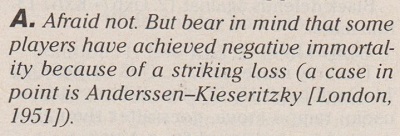
Chess Life, May 1996, page
15 (a reply in the ‘Evans on Chess’ column).
(11323)
‘Unfortunately the two-mover is virtually exhausted after all these centuries.’
Source: page 33 of The Chess Beat by Larry Evans (Oxford, 1982). The syndicated column can be viewed on-line (Reno Gazette-Journal, 31 December 1977, page 13).
After C.N. 328 quoted the remark, two readers responded in C.N. 461. R.F. Bradley (Donaghadee, Northern Ireland) commented that the two-mover could hardly be exhausted when such compositions as the following were appearing:
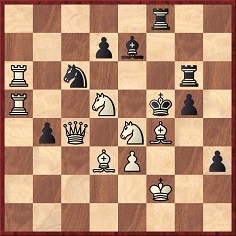
K. Braithwaite (Canada), the Problemist, November 1982
Key: 1 Bh2. ‘This brilliant move allows the two black king flights – with a difference. The white king is in check to the rook’ (R.F. Bradley).
Michael McDowell (Newtownards, Northern Ireland) wrote regarding Larry Evans:
‘His statement contains an historical inaccuracy. The modern two-mover, in which emphasis is placed on thematic content, dates from the middle of the nineteenth century, when composers began to produce problems showing definite ideas instead of the normal collection of unrelated mates. Even up to the 1840s, little attention was paid to the two-mover. Alexandre’s Collection des plus beaux problèmes d’échecs (1846) contains 2,020 problems, of which 94, or 4.6%, are two-movers. Compare this with the FIDE Album 1945-55, which contains 1,981 problems, two-movers numbering 543, or 32%. (Figures quoted from The Two-move Chess Problem 1285-1846 by C.M. Champion, the Problemist September and November 1969.)’
From the back cover of Evans’ book This Crazy World of Chess (New York, 2007):

In Chess Thoughts we offer this general suggestion:
Praise received should be quoted sparingly, and never when from a disreputable source.
An extract from a letter to us dated 23 May 1990 from Warren Goldman:
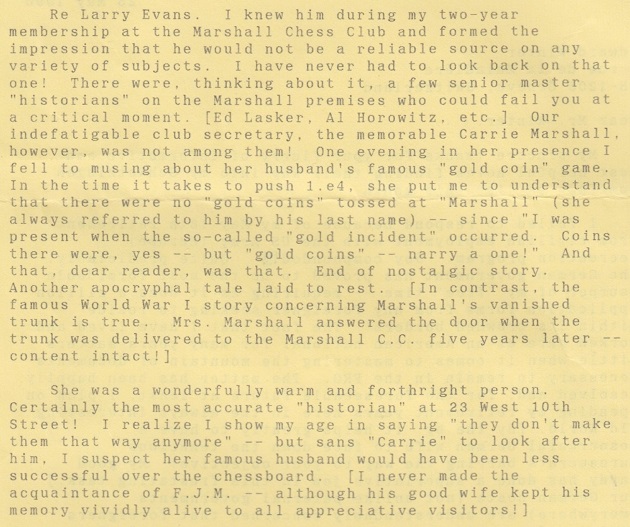
(11844)
Addition on 20 January 2021:
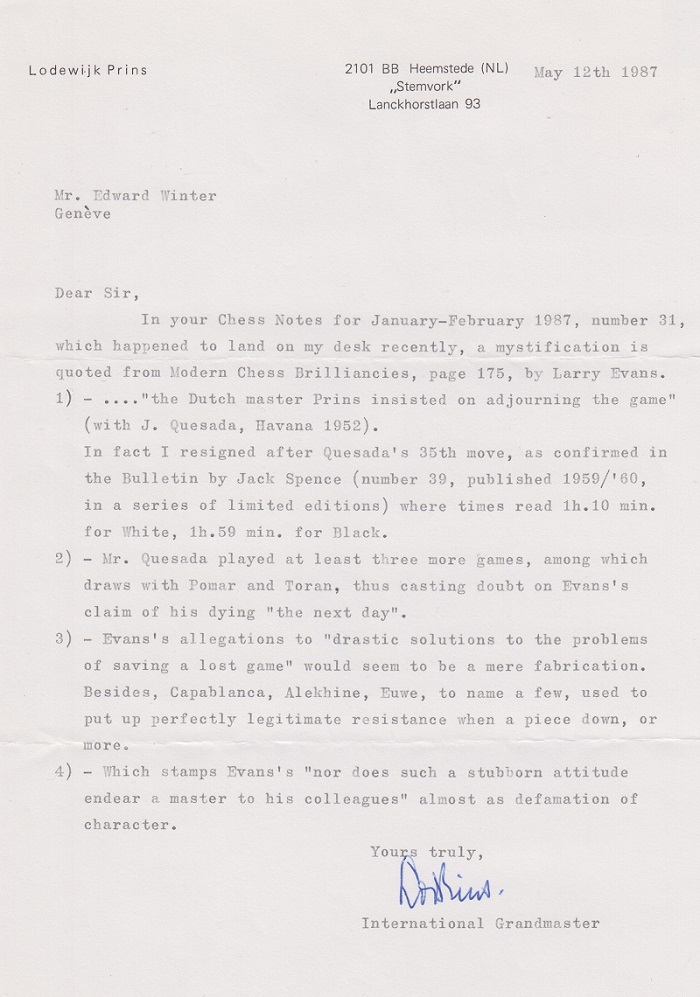
Addition on 21 February 2021 (Elo v Evans):
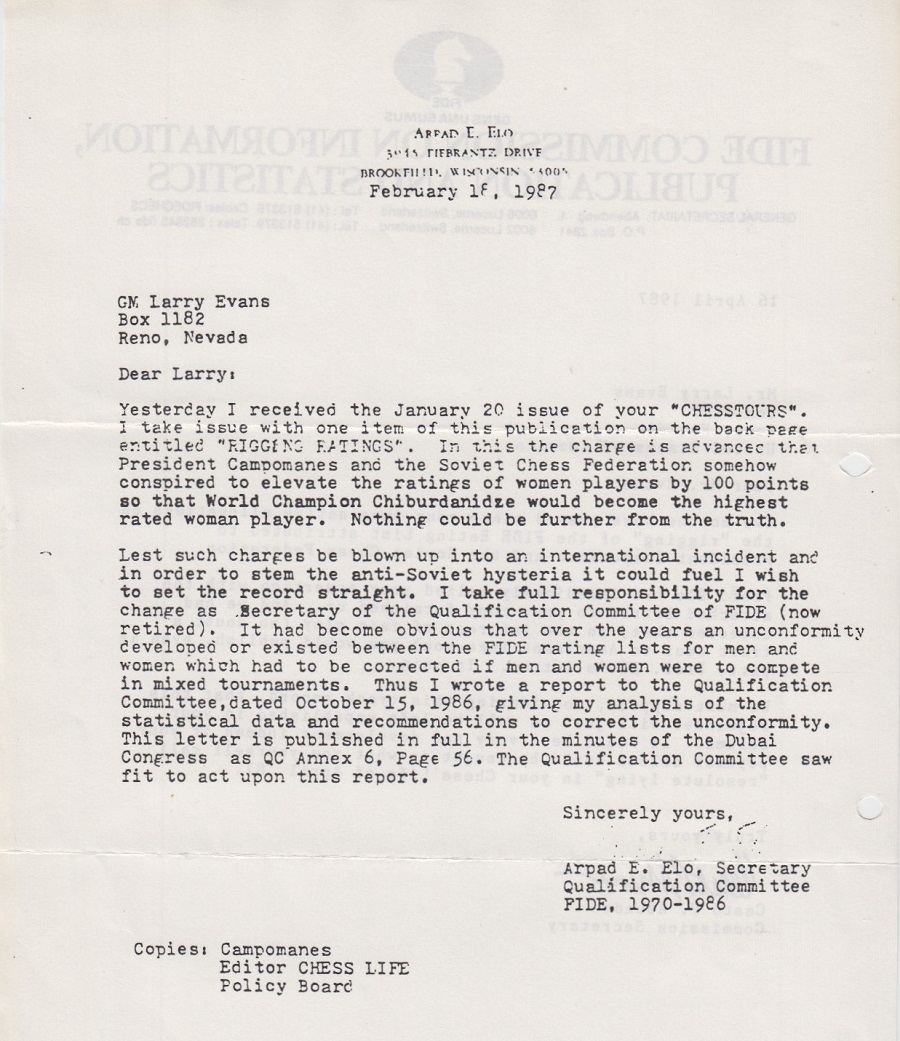
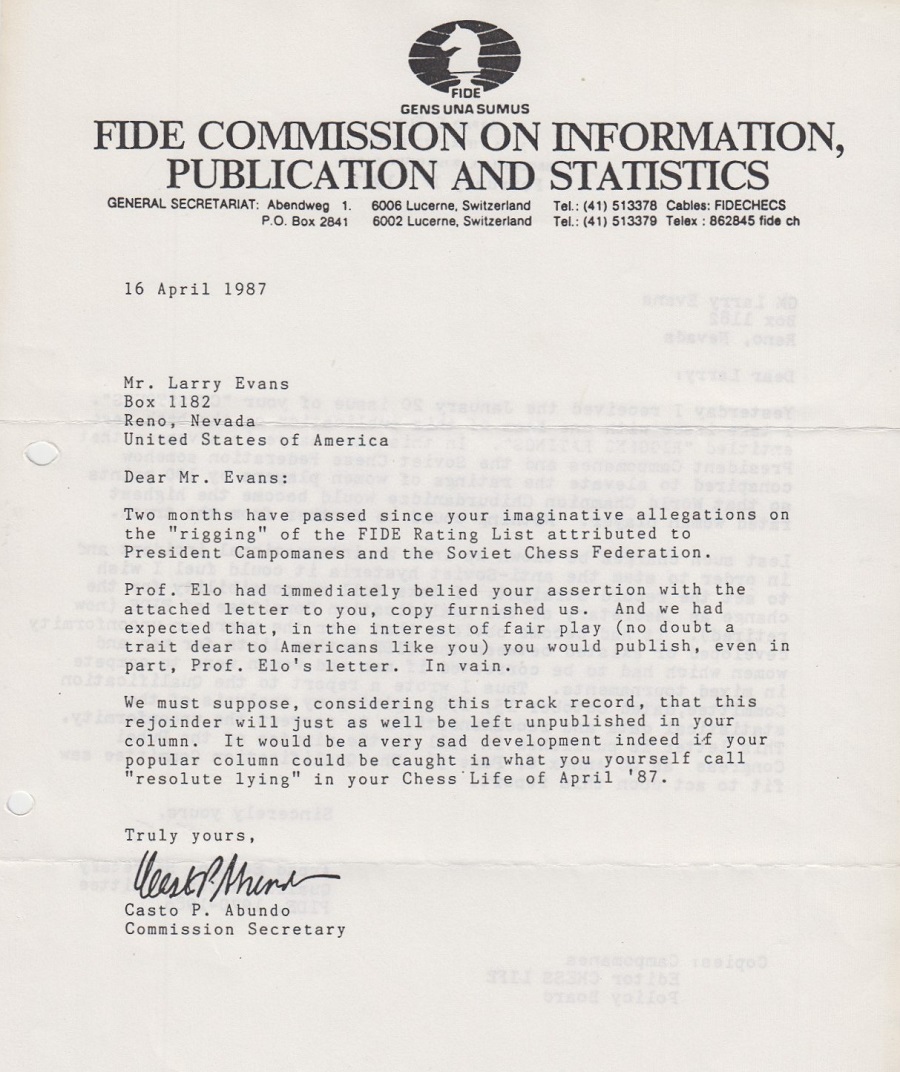
Addition on 15/17 January 2025:
Richard Pask (Weymouth, England) informs us that he has three books (Checkers for the Novice, Complete Checkers: Insights and Complete Checkers: Repertoire which are available on Amazon and can also be downloaded without cost from The Checker Maven.
Our correspondent adds:
‘The tactical aspects of the game are well known (Chernev considered it to be 99% tactical), but the strategic hardly at all. These are brought to the fore in Complete Checkers: Insights, as a quick review of the contents page will reveal.
Diagram 377 of Complete Checkers: Insights features the conclusion of an “odds” game (12 men v 11) between Larry Evans and Tom Wiswell, where the latter secures a neat draw.’
Addition on 11 February 2025:
Copying shows another example of Larry Evans’ conduct. In a case concerning plagiarism by Raymond Keene, ‘Larry Evans wrote two newspaper chess columns which chopped off the narrative of the Donaldson-Keene exchanges prematurely, thereby concealing the fact that Donaldson won hands-down’.
Addition on 23 March 2025:
As a prelude to commenting on some chess scandal or other, whether real, imagined or invented, Larry Evans sometimes gave a grand chess and marbles reference. For example:
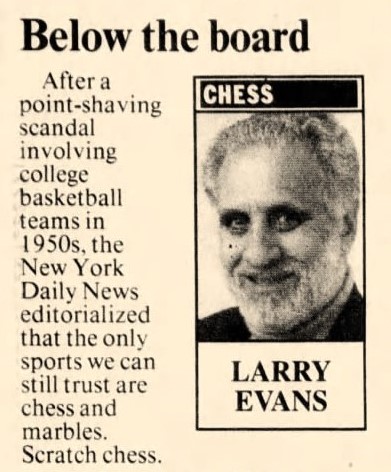
Reno Gazette-Journal, 13 November 1993, page 2E
The remark in the New York Daily News is readily copied from page 338 of Chess Review, November 1951, which was advertising The Treasury of Chess Lore by Fred Reinfeld (New York, 1951), but Evans’ word ‘editorialized’ comes from nowhere. The chess/marbles remark was merely from an anonymous reader on the letters page:
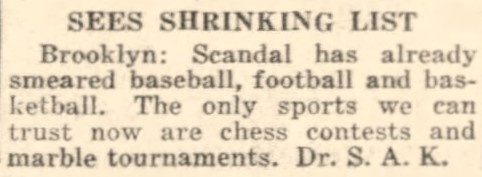
Daily News, 4 February 1951, page 47
Page 23 of the 12 February 1951 issue of the Daily News had a brief addition from another reader:
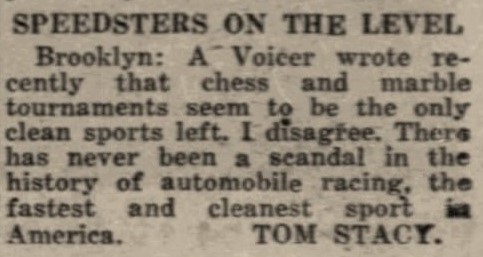
That was all.

Mate in two
Before proceeding, readers are invited to tackle this composition, as well as its twin (black knight on b3 instead of c2):

Mate in two
The problem (‘S.G. Voronov, USSR’) appeared on page 582 of the October 1970 Chess Life & Review, in the ‘Benko’s Bafflers’ column. The solutions were given by Pal Benko on page 643 of the November 1970 issue:
‘1 R-R6? N-K6! 1 B-Q5! Twin: 1 B-Q5? N-B4 1 R-R6! The deceptive becomes real in the twin.’
Drawing this problem to our attention, Tony Bronzin (Newark, DE, USA) notes that the first diagrammed position was taken up on pages 143-144 of the March 1971 Chess Life & Review by a reader of the ‘Larry Evans on Chess’ column, Robert Stachowski of Milwaukee.

Mate in two
Concerning the published key move, 1 B-Q5, he asked:
‘Isn’t 1 R-B5ch an alternate solution?’
Evans’ reply:
‘Right! If 1...K-K3 (1...K-Q3 2 Q-Q7 mate) 2 R/7-B6 mate.’
Mr Bronzin informs us that nothing more on the Voronov problem can be found until much later. On page 266 of the May 1976 Chess Life & Review, Benko wrote:
‘My problem column receives many attempted cooks, a large number of which turn out to be mistaken. Of course, problemists also make mistakes. I obviously cannot publish the wrong cooks, and apparently some readers do not realize that when their cooks do not get published it is because they are not correct. Then they send them elsewhere. Look at this:
S.G. Voronov

White mates in two
Twin: Nc2-b3
This position appeared in Benko’s Bafflers in October 1970. A reader suggested that the problem was “cooked” by 1 R-B5ch. (The published solution is B-Q5.) I did not publish that “cook”. To my great surprise, I found the same question in Larry Evans’s column of March 1971. “Isn’t 1 R-B5ch an alternate solution?” Evans’s answer: “Right! If 1...K-K1 [sic – K-K3] (1...K-Q3 2 Q-Q7) 2 R/7-B6 mate.”
Obviously the “cook” is cooked: after 1 R-B5ch, K-K3 is a discovered check to White and there is no time for mate! At the time I drew the attention of Grandmaster Evans to his error and waited for the appearance of the correction. In vain, alas.
It is very difficult to admit a mistake. This is a weakness of human nature.’
That was the conclusion of a three-page ‘In the Arena’ article by Benko, subtitled ‘Errare humanum est’. Two thirds of the final page comprised corrections of Larry Evans on various points, and Benko’s introductory paragraph in that section was:
‘Of course, I am not immune to error, but it hurts me when someone claims there is a mistake in my work when there is none, especially when that someone is a grandmaster.’
(12167)
See also Chess Jottings, Chess: the Need for Sources and A Chess Mess.
To the Chess Notes main page.
To the Archives for other feature articles.
Copyright: Edward Winter. All rights reserved.